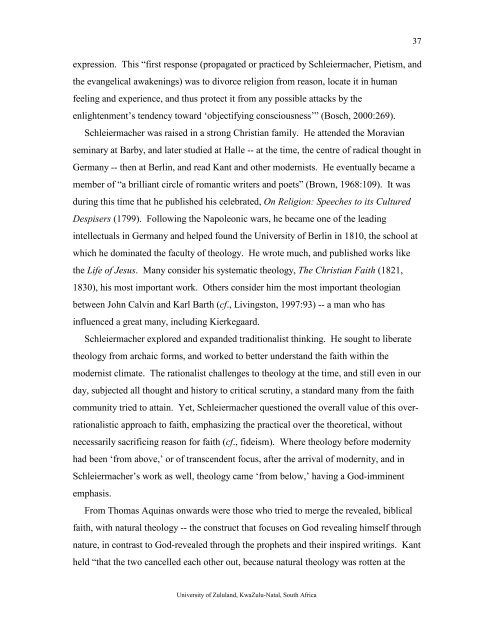Haase_UZ_x007E_DTh (2).pdf - South African Theological Seminary
Haase_UZ_x007E_DTh (2).pdf - South African Theological Seminary
Haase_UZ_x007E_DTh (2).pdf - South African Theological Seminary
Create successful ePaper yourself
Turn your PDF publications into a flip-book with our unique Google optimized e-Paper software.
37<br />
expression. This “first response (propagated or practiced by Schleiermacher, Pietism, and<br />
the evangelical awakenings) was to divorce religion from reason, locate it in human<br />
feeling and experience, and thus protect it from any possible attacks by the<br />
enlightenment’s tendency toward ‘objectifying consciousness’” (Bosch, 2000:269).<br />
Schleiermacher was raised in a strong Christian family. He attended the Moravian<br />
seminary at Barby, and later studied at Halle -- at the time, the centre of radical thought in<br />
Germany -- then at Berlin, and read Kant and other modernists. He eventually became a<br />
member of “a brilliant circle of romantic writers and poets” (Brown, 1968:109). It was<br />
during this time that he published his celebrated, On Religion: Speeches to its Cultured<br />
Despisers (1799). Following the Napoleonic wars, he became one of the leading<br />
intellectuals in Germany and helped found the University of Berlin in 1810, the school at<br />
which he dominated the faculty of theology. He wrote much, and published works like<br />
the Life of Jesus. Many consider his systematic theology, The Christian Faith (1821,<br />
1830), his most important work. Others consider him the most important theologian<br />
between John Calvin and Karl Barth (cf., Livingston, 1997:93) -- a man who has<br />
influenced a great many, including Kierkegaard.<br />
Schleiermacher explored and expanded traditionalist thinking. He sought to liberate<br />
theology from archaic forms, and worked to better understand the faith within the<br />
modernist climate. The rationalist challenges to theology at the time, and still even in our<br />
day, subjected all thought and history to critical scrutiny, a standard many from the faith<br />
community tried to attain. Yet, Schleiermacher questioned the overall value of this overrationalistic<br />
approach to faith, emphasizing the practical over the theoretical, without<br />
necessarily sacrificing reason for faith (cf., fideism). Where theology before modernity<br />
had been ‘from above,’ or of transcendent focus, after the arrival of modernity, and in<br />
Schleiermacher’s work as well, theology came ‘from below,’ having a God-imminent<br />
emphasis.<br />
From Thomas Aquinas onwards were those who tried to merge the revealed, biblical<br />
faith, with natural theology -- the construct that focuses on God revealing himself through<br />
nature, in contrast to God-revealed through the prophets and their inspired writings. Kant<br />
held “that the two cancelled each other out, because natural theology was rotten at the<br />
University of Zululand, KwaZulu-Natal, <strong>South</strong> Africa

















